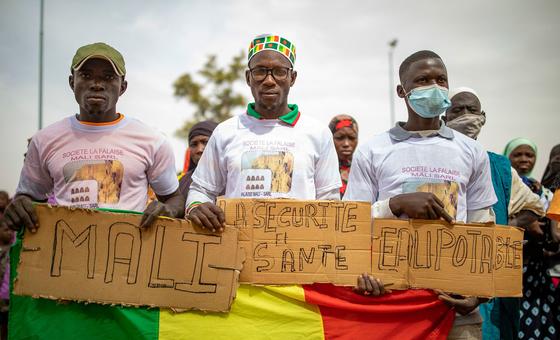Briefing ambassadors on Africa Day, Under-Secretary-General Rosemary DiCarlo presented the latest UN report on securing predictable, sustainable and flexible resources for AU-led peace support operations mandated by the Council.
The changing nature of conflict in Africa has forced the partners to adapt their operations in response to new and evolving challenges.
Secure funding stream
“The case for adequately financing AU-led peace support operations is beyond solid. We are therefore hopeful that the Security Council will agree to provide its backing, including allowing access to UN assessed contributions,” she said.
The report lists the joint mission model and support packages delivered by the UN as the two most practical financing options, which would be authorized on a case-by-case basis.
It also outlines a standardized consultative planning and mandating process, through which the UN, the AU and subregional configurations can assess the required response to an emerging crisis.
“This process would reassure the Council that a given situation has been systematically reviewed by all the relevant entities. It would thus help the Council decide whether assessed contributions can be mandated,” she said.
Rising insecurity, funding shortfalls
Ms. DiCarlo gave an overview of AU and UN cooperation, noting that it has grown significantly since the signing of a 2017 joint framework on enhanced partnership in peace and security.
She said over the past 20 years, the AU has shown readiness to speedily deploy peace support operations in response to conflicts, including in Burundi, the Central African Republic, Comoros, Mali, Somalia and Sudan.
These missions faced recurrent problems such as funding shortfalls, and although support provided by the UN and partners has been useful, it has also been unpredictable.
“As we look at different parts of the continent, it is obvious that the need to put AU peace operations on a solid footing is increasingly pressing,” she said, referring to situations in places such as the Sahel, Somalia, Mozambique, and the eastern Democratic Republic of the Congo.
“In Africa and elsewhere, rising insecurity is characterized by an increasing use of asymmetric tactics and sophistication of armed extremist groups and expanding influence of transnational organized crime,” said continued. “These connected phenomena require commensurate global approaches and responses.”
Progress on compliance
The funding of AU-led operations has been a longstanding issue in the Security Council, particularly over establishing a mechanism to allow partial financing through UN assessed contributions.
Ms. DiCarlo reported that in line with two Council resolutions, the AU has made significant progress to address the financial challenge of its peace operations, and on ensuring compliance with international human rights and humanitarian law, as well as UN conduct and discipline standards.
Noting that AU peace operations should be considered as part of the range of responses to crises in Africa, alongside established UN mechanisms, she appealed for the Council’s support.
“As the Secretary-General has stated, concrete action on this longstanding issue will address a critical gap in the international peace and security architecture and bolster the efforts of the African Union to tackle peace and security challenges on the continent.”
Stand with Africa: Guterres
Meanwhile, UN chief António Guterres noted that cooperation and solidarity to advance the continent’s future is more needed than ever.
“I look forward to African governments continuing to seize the opportunities presented by the continent’s natural, human, and entrepreneurial richness, by working to increase private investment and raise resources at home,” he said in his message for Africa Day.
The annual commemoration May celebrates the founding of the Organization of African Union, the African Union precursor, on 25 May 1963.
The Secretary-General urged the international community to stand with Africa as multiple rises – from COVID-19 to climate and conflict – continue to cause great suffering there.
He further stated that African countries are underrepresented in global governance institutions, such as the UN Security Council, and denied the debt relief and concessional funding they need.
“Africa deserves peace, justice and international solidarity,” he said. “With international cooperation and solidarity, this can be Africa’s century.”

